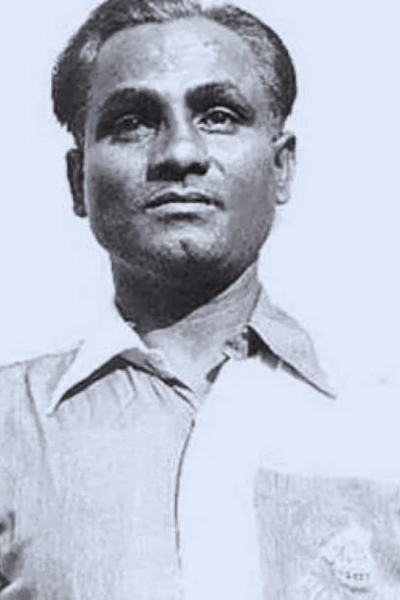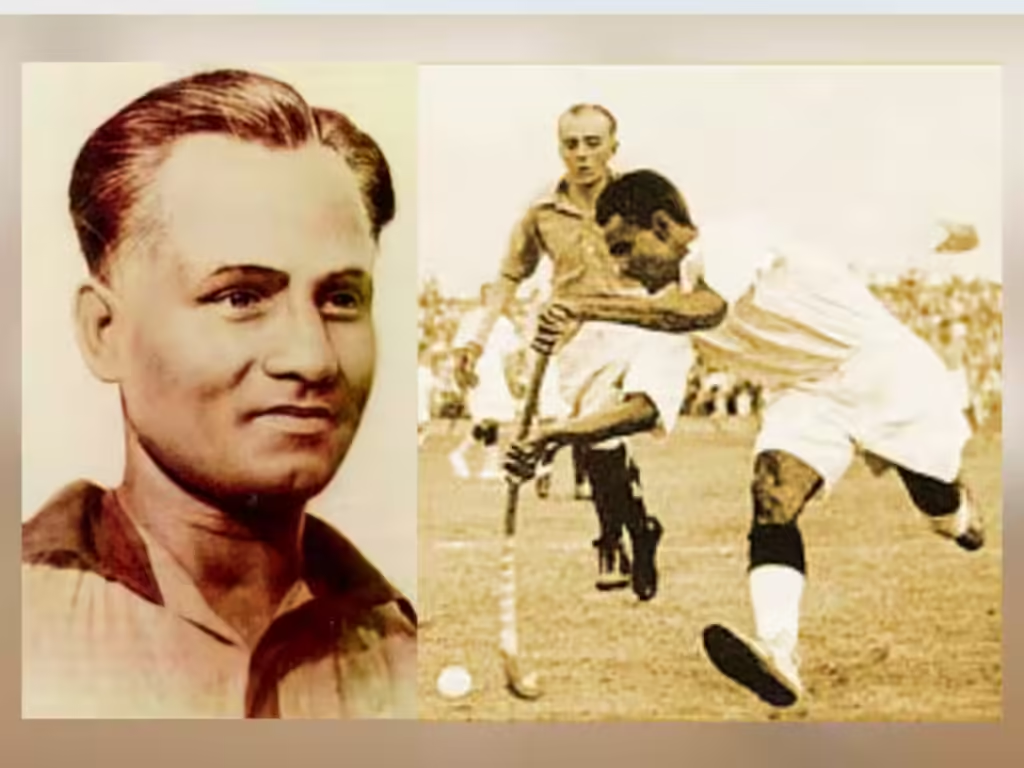Major Dhyan Chand (29 August 1905 – 3 December 1979) is celebrated as one of the greatest field hockey players in the history of the sport. Known for his extraordinary ball control and goal-scoring prowess, Chand earned three Olympic gold medals for India in 1928, 1932, and 1936, during a period when India dominated international field hockey. His influence extended beyond these victories, as India went on to win the field hockey event in seven out of eight Olympics from 1928 to 1964. Chand’s legacy continues to inspire, with his birthday commemorated as National Sports Day in India, and the country’s highest sporting honor, the Major Dhyan Chand Khel Ratna Award, named in his honor.

Early Life
Dhyan Chand was born on 29 August 1905 in Allahabad, in a Rajput family. His father, Sameshwar Singh, was a soldier in the British Indian Army and also played hockey for the army. Due to his father’s frequent transfers, Chand’s family moved frequently, resulting in him terminating his education after only six years of schooling. The family eventually settled in Jhansi, Uttar Pradesh.
Young Dhyan Chand did not initially show a serious inclination towards sports, though he enjoyed wrestling. He mentioned that he did not play much hockey worth noting before joining the Army, except for some casual games with friends in Jhansi.
| Attribute | Value |
|---|---|
| Full Name | Major Dhyan Chand |
| Birth Date | 29 August 1905 |
| Death Date | 3 December 1979 |
| Place of Birth | Allahabad, British India (now Prayagraj, India) |
| Nationality | Indian |
| Nickname | The Wizard, The Magician of Hockey |
| Primary Sport | Field Hockey |
| Olympic Gold Medals | 1928, 1932, 1936 |
| Playing Position | Centre-forward |
| Years Active Internationally | 1926–1949 |
| Goals Scored (International) | 570 goals in 185 matches |
| Total Goals (Domestic and International) | Over 1,000 |
| Autobiography | Goal |
| Major Award | Padma Bhushan (1956) |
| Birthday Celebration | National Sports Day in India (29 August) |
| Highest Sporting Honour in India | Major Dhyan Chand Khel Ratna Award |
| Family | Father: Sameshwar Singh Mother: Sharadha Singh Brothers: Mool Singh, Roop Singh |
| Education | Aligarh Muslim University Victoria College, Gwalior |
| Military Rank | Major |
| Key Tours | New Zealand (1926–27) |
| Famous Incident | Stick checked for magnets in the Netherlands |
| BBC Comparison | “Hockey’s equivalent of Muhammad Ali” |
Early Career (1922–1932)
On his 17th birthday, 29 August 1922, Dhyan Chand enlisted as a sepoy (private) in the 1st Brahmans of the British Indian Army. Between 1922 and 1926, he exclusively played in army hockey tournaments and regimental games. He was selected for the Indian Army team that toured New Zealand, where they won 18 matches, drew two, and lost only one. Following this successful tour, Chand was promoted to Lance Naik in 1927.
In 1928, after the reintroduction of field hockey in the Olympics, the newly formed Indian Hockey Federation (IHF) held an Inter-Provincial Tournament to select the best team for the Amsterdam Olympics. Dhyan Chand, playing for the United Provinces team, showcased his exceptional skills and was selected for the Olympic team.

Olympic Triumphs
In the 1928 Amsterdam Olympics, India dominated their group, defeating Austria, Belgium, Denmark, and Switzerland with Chand scoring prolifically. In the final, despite several players, including Chand, being unwell, India defeated the Netherlands 3–0 to win their first Olympic gold medal in field hockey. Chand was the tournament’s top scorer with 14 goals in five matches.
The 1932 Los Angeles Olympics saw India continue their dominance, with Chand and his brother Roop Singh forming a formidable duo. India won all their matches, with a significant 24–1 victory against the USA in the final. Chand scored 12 goals in the tournament, again emerging as the top scorer.
In the 1936 Berlin Olympics, despite political tensions and the rise of Nazi Germany, India won their third consecutive gold medal. Dhyan Chand’s exceptional performance, including a 8–1 victory over Germany in the final, further solidified his reputation. A famous incident from this period involves the German authorities breaking Chand’s hockey stick to check for hidden magnets due to his incredible ball control.
Legacy and Recognition
Dhyan Chand’s international career spanned from 1926 to 1949, during which he scored 570 goals in 185 matches, according to his autobiography, “Goal”. In his entire domestic and international career, he scored over 1,000 goals. The BBC referred to him as the “hockey’s equivalent of Muhammad Ali”.
In recognition of his contributions, the Government of India awarded him the Padma Bhushan, the nation’s third highest civilian honor, in 1956. Dhyan Chand’s birthday, 29 August, is celebrated as National Sports Day in India, and the Major Dhyan Chand Khel Ratna Award, the highest sporting honor in India, is named after him.
Personal Life and Later Years
Dhyan Chand was born to Sharadha Singh and Sameshwar Singh. His father played hockey for the British Indian Army, and his younger brother Roop Singh also became a renowned hockey player. Dhyan Chand’s early life involved frequent relocations due to his father’s army transfers, which affected his education. He later studied at Aligarh Muslim University and graduated from Victoria College, Gwalior, in 1932.
Despite his initial lack of interest in sports, Chand’s talent in hockey blossomed once he joined the Army. His disciplined life in the military, combined with his natural talent, helped him hone his skills and become one of the greatest players in the history of field hockey.
Major Dhyan Chand’s contributions to field hockey are unparalleled. His extraordinary skills, combined with his dedication and sportsmanship, made him a legend in the sport. His legacy continues to inspire generations of athletes, and his name remains synonymous with excellence in field hockey. Major Dhyan Chand’s story is a testament to how talent, when combined with hard work and determination, can lead to extraordinary achievements and enduring legacy.
